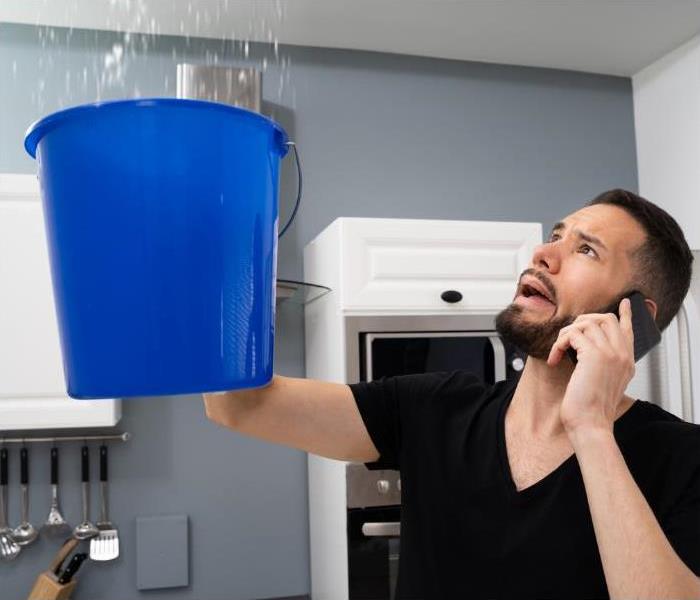Recent Water Damage Posts
The Role of Plumbing Inspections in Preventing Costly Repairs
4/19/2023 (Permalink)
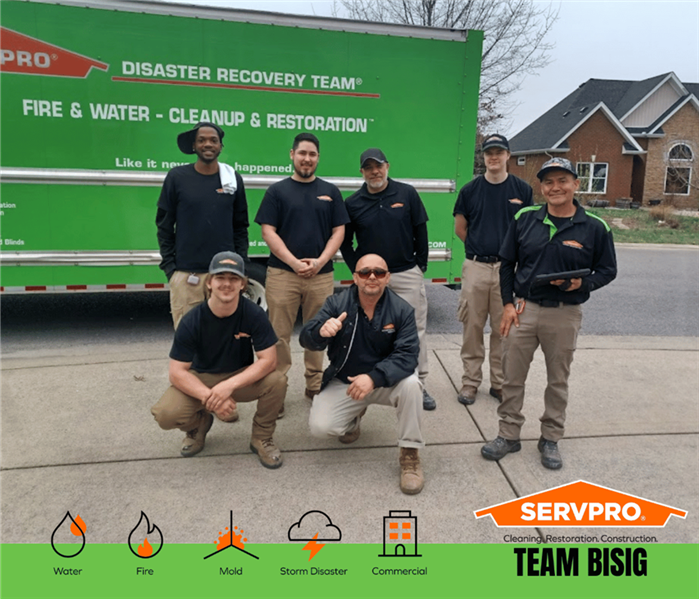 Our local SERVPRO restoration team is here to help! Whether you live in Murfreesboro, Smyrna, or anywhere in between.
Our local SERVPRO restoration team is here to help! Whether you live in Murfreesboro, Smyrna, or anywhere in between.
A well-maintained plumbing system is essential for any home or business, as it directly affects the functionality, comfort, and safety of the property. Regular plumbing inspections can help prevent costly repairs and extend the life of your plumbing system. In this article, we will discuss the role of plumbing inspections in preventing expensive repairs and why it's essential to schedule routine inspections for your property.
- Early Detection of Potential Issues A key benefit of regular plumbing inspections is the early detection of potential issues. When you schedule an inspection, a professional plumber will examine your plumbing system for any signs of wear, corrosion, or damage. By identifying potential problems early on, you can address them before they escalate and cause costly damage to your property. Early detection of issues like leaks, clogs, and faulty fixtures can save you a significant amount of money on repairs and replacements.
- Preventing Water Damage Water damage is a common and costly issue that can arise due to problems in the plumbing system. Leaks, burst pipes, and overflowing fixtures can all lead to water damage, which can be expensive to repair and may require professional water damage restoration services. Regular plumbing inspections help prevent water damage by ensuring that all components of your plumbing system are functioning correctly and identifying any issues before they lead to more extensive damage.
- Maintaining Optimal Efficiency A properly functioning plumbing system is essential for maintaining the efficiency of your home or business. Issues such as leaks, clogs, and damaged fixtures can all contribute to increased water consumption and higher utility bills. By scheduling regular plumbing inspections, you can ensure that your plumbing system is running optimally, which can help save you money on your water bills and reduce your environmental impact.
- Extending the Lifespan of Your Plumbing System Regular plumbing inspections can help extend the lifespan of your plumbing system by identifying and addressing any issues that may cause damage or decrease its efficiency. By investing in routine inspections and maintenance, you can prevent the need for premature replacements and costly repairs, ultimately saving you money in the long run.
- Ensuring Compliance with Local Regulations For commercial properties, regular plumbing inspections are essential to ensure compliance with local building codes and regulations. Non-compliance can result in fines and penalties, as well as potential safety hazards for employees and customers. Scheduling routine plumbing inspections can help you avoid these issues and maintain a safe, compliant environment for your business.
- Enhancing Property Value A well-maintained plumbing system is a valuable asset for any property owner. Regular plumbing inspections can help you maintain and even enhance your property's value by ensuring that your plumbing system is functioning efficiently and effectively. When it comes time to sell your property, a well-maintained plumbing system can be a significant selling point for potential buyers.
Conclusion:
The importance of regular plumbing inspections for home and business owners cannot be overstated. By investing in routine inspections, you can detect potential issues early on, prevent costly repairs, maintain optimal efficiency, and extend the lifespan of your plumbing system. Ultimately, this proactive approach will save you money and ensure the comfort, safety, and functionality of your property. However, in case problems arise and water damage occurs – contact SERVPRO of Rutherford County today. Our team of experts has the knowledge an equipment to handle any type or severity of water damage. Enjoy the peace of mind that comes with knowing your plumbing system is in good hands. We’re always here to help.
Cleaning Up After a Burst or Broken Pipe
2/9/2022 (Permalink)
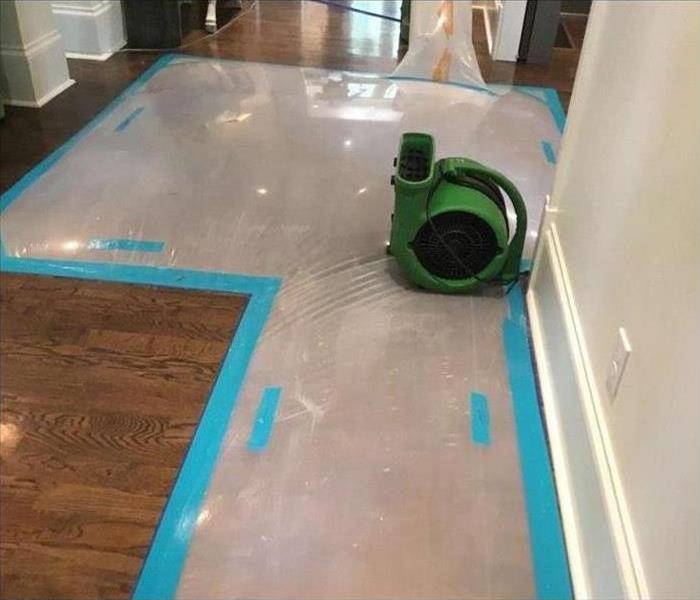 Residential water restoration in Walterhill, TN.
Residential water restoration in Walterhill, TN.
Cleaning Up After a Pipe Burst or Break
Every homeowner winds up with a water accident sooner or later. If it isn’t a broken pipe or a water heater that gives out, it will be a leaky seal or backed up sump pump. That’s just the nature of homeownership. When you are cleaning up after a plumbing emergency that left water in your home in Walterhill, TN, it’s important to understand the steps you need to take to get yourself back on your feet again quickly.
1. Shut Off Your Water Main. Before you bother calling for a plumber to fix the pipe itself, make sure you turn off the water. This will stop incoming water and allow for cleanup if the problem is a plumbing emergency.
2. Contact Your Insurance Company. Most insurance companies cover cleaning services and repair for water damage from plumbing accidents. Your regular plan deductible will apply. Major carriers often preauthorize cleanup services to streamline billing, so give your carrier’s claims line a quick call.
3. Contact a Cleaning Service. Residential water damage cleanup involves removing the water in home areas and dry cleaning the carpet, furniture, and other items in the area. If you have multiple phone lines in your household, calling for a cleaning service in Walterhill, TN, on one line while a family member contacts your insurance company can speed up the entire process.
4. Remove Dry Items. Once you know that help is on the way, it’s time to take dry and unaffected items out of the water damaged areas of the home. That way, the cleanup crew can more easily get to the affected belongings in your home.
5. Contact a Plumber. Cleaning services are not usually plumbing services, so if you have experienced a plumbing emergency, you will need to call for a plumber to fix the problem before turning your water back on.
Remember, while it is important to take care of the broken pipe quickly, water in home living areas continues to do damage until it is properly cleaned up. That’s why it’s important to contact a dry cleaning service right away.
How Does Water Damage Result in Secondary Damage?
12/28/2021 (Permalink)
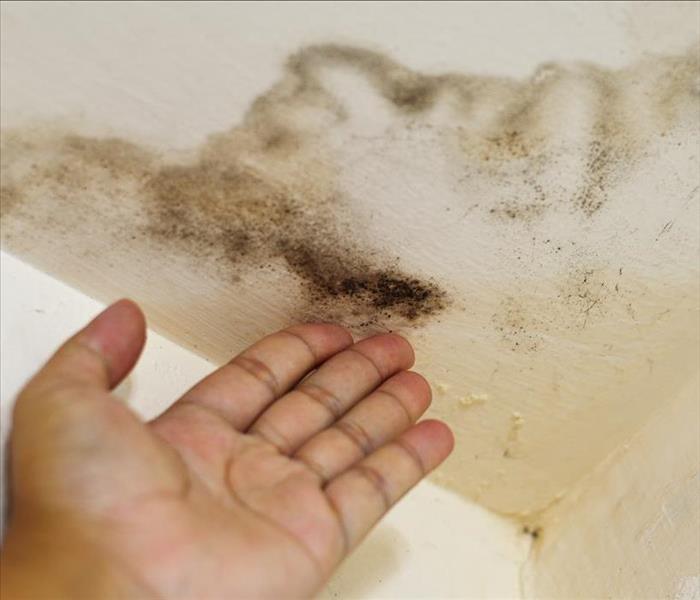 Water damage leads to mold growth in a home in La Vergne, TN.
Water damage leads to mold growth in a home in La Vergne, TN.
How To Prevent Secondary Damage
Water damage creates conditions that may lead to other types of damage. If timely measures are not taken to mitigate primary damage, additional damage is likely to result. Black mold is one possible consequence of water damage. Find out about how to prevent or mitigate three of the most common types of secondary damage.
Corrosion
Corrosion is a chemical reaction caused by dissolved gases and minerals found in most water. This type of damage:
- Affects metal components
- May cause electronics to short-circuit
- Can sometimes be cleaned
Corroded pipes or studs should be replaced. Restoration experts can recommend whether appliances or electrical devices that have sustained water damage can be restored or will need to be replaced. Corrosion may increase the risk of an electrical fire.
Mold
Many types of fungi may grow in a residence that has suffered water damage. There are more than 100,000 different types of mold, including Stachybotrys or black mold. Mold will thrive in areas that have:
- High humidity
- Food sources
- Poor ventilation
Some of the most common sources of nutriment for fungi include dirt, dust, and cellulose. The latter is a plant fiber found in building materials such as drywall, insulation, and wood.
Rot
Rot affects wooden building materials and contents. Depending on the severity of water damage, it may be possible to restore wood. Otherwise, it will be necessary to tear out and replaced damaged wood. Prevent rot by:
- Removing standing water
- Lowering humidity levels
- Sealing wood
These measures can help to reduce the likelihood of rot. Consult with restoration experts regarding the best methods for dealing with water-damaged wood.
These are only three of the most common types of secondary damage that result from water damage. The best way to lower the risk of electrical issues, structural damage, black mold, or ruined contents is to hire cleanup and restoration professionals in La Vergne, TN.
Will my Insurance Cover Water Damage? Answers to Important Water Damage Questions
11/10/2021 (Permalink)
A lot of people have this question after an unexpected plumbing incident or water backup in Murfreesboro, TN. No one wants to have a pipe burst in their home or experience a sewage backup that ruins their day. Because these things usually happen unexpectedly, it’s a great idea to be prepared in advance to minimize damages. That’s why it’s important to be well-informed so that in the case of an emergency, you can respond knowledgeably to a situation.
In this article, we’ll go over some of the most common questions about whether or not your insurance will cover the costs of repairing water damage at your home or business, as well as how to best prepare in advance for this situation.
We also offer a free Emergency Response Plan to further protect your business in the case of an emergency.
Will my Insurance Cover Water Damage?
When you get unexpected water damage in your home, your insurance provider will likely cover it. The question is how much they are going to pay for and what do you have to be prepared for when it comes time to file a claim.
Homeowners insurance is meant to cover you in the case of unexpected water damage from events like a pipe burst, toilet overflow, damaged water heater, or other water damage events.
While lack of maintenance can affect your coverage in the case of an emergency, this is not a common issue and is easy to resolve by ensuring you check your main water systems at least once per year. Examples to check could be your water heater, water meter, dishwasher, fridge, HVAC drain, and/or leaky faucets, drains, or showerheads. And if your home has them, your septic tank and water softener would also be important maintenance candidates.
Is Water Damage an Emergency?
Yes, when there is a great enough flow of water from a clean or contaminated source, water damage can be one of the most common emergencies you may face in your home. Whether the water comes from heavy rainfall with wind, a sudden flood, roof damage, burst pipes or appliance lines, or even a sewage backup, a water damage problem can become a serious threat to your property's safety and value. Not only is the water itself a property damaging issue, but if allowed to remain for more than 24-48 hours, mold can begin to take hold.
If you need immediate assistance, our team of trained technicians at SERVPRO of Rutherford County, we’ll make sure to leave your home "Like it never even happened."
Call us today at (615) 849-9794
The Business Continuity Plan: What Is It and Why Does It Matter
9/26/2021 (Permalink)
Both small and large businesses can easily overlook a business continuity plan; however, it is often the most valuable tool in your arsenal when a disaster happens and threatens continued operation.
1. What Is It?
A business continuity plan (BCP) is an emergency document that ensures a business can continue to function during any unforeseen events. The BCP will likely include contacts, emergency response procedures, checklists, and any change management procedures. While a business may not be able to operate out of a specific location physically, it is still necessary to manage assets and vital information.
2. Why Does It Matter?
While a company can seek assistance from restoration specialists in the Walterhill, TN, area, their facility may be out of commission for a lengthy period, depending on the severity of the emergency. A BCP provides a company with an emergency response plan that helps operations continue despite any difficulty.
3. Basic Things to Consider
A basic BCP should focus on the continuity of business, and this means that it should include any revisions to management procedures, any necessary contacts, any critical data, and steps that outline any expected actions to be taken by the manager in charge. Also, BCPs are fluid documents, meaning that it may be necessary to change and revise them from time to time.
4. Where to Find More Information
If you are looking to begin the process of developing your business’s BCP, then you may want to review the information at ready.gov. You will find information on every aspect of a BCP, from the business impact analysis, recovery strategies, plan development, and to the testing and exercise phase.
A business continuity plan may be one of the most valuable documents to your business, as it ensures that in instances of emergency and business interruption, your company can still find a way to operate and maintain continuity.
What Homeowners Need To Know About Water Damage After Minor Flooding
8/23/2021 (Permalink)
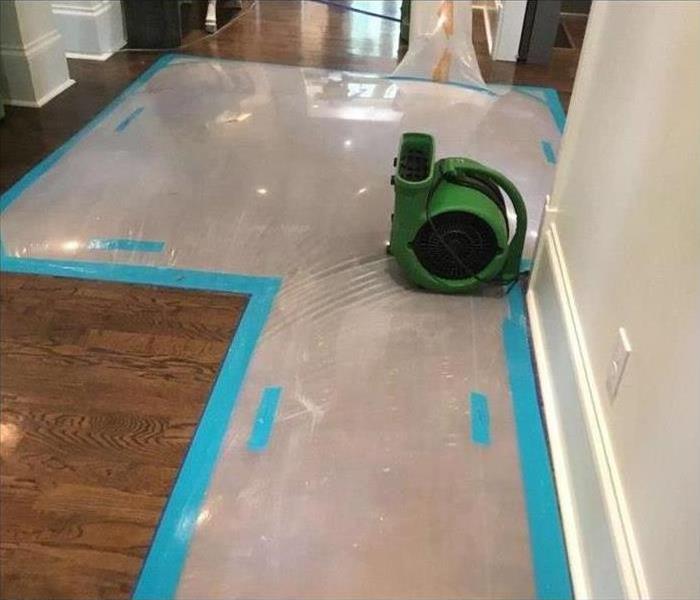 Residential water damage
Residential water damage
Water Damage After Minor Flooding
Water damage is easy to identify when flooding covers streets and submerges vehicles. When that same water pours into a home in Blackman, TN, and covers floors two feet deep, the resulting destruction is expected, and often immediately addressed. But what happens when clean water floods the floors an inch or two after a pipe burst? Homeowners may be unaware of the dangers small amounts of water can cause floor coverings, walls, and baseboards.
Potential Problems
A burst pipe, overflowing toilet, or broken water heater can all flood floors. Once the initial water
has been cleaned up, most homeowners know to look for, and quickly address, many common problems with a professional. Here are a few possibilities to consider:
• Ebbing water pressure – A possible rupture in a water line. This can range from a small, inconsistent leak at a connection to a continuous leak at a broken line.
• Discolored water or funny smell and taste – A possible rusty pipe or a broken pipe that allows foreign bodies into the water supply.
• Stains on walls – A possible water leak behind walls, or water seepage into wood or sheetrock by the flood waters.
Invisible Damages
Often after homeowners clean up a pipe burst caused flood, they look for the visible signs of water damage but are completely unaware of the hidden damages left behind. That is why it is usually expedient to contact a restoration team to evaluate the damage. The team can remove carpets and pads, check underflooring for damage, and set up dehumidifiers to speed the evaporation of remaining water. Most importantly, the restoration specialists can remove baseboards and ventilate the remaining water that is hidden behind the boards. This simple step can help thwart mold.
Effective Solutions
Dealing with the consequences of even a minor flood from a pipe burst in Blackman, TN, while the property is still wet can not only help mitigate the immediate damage, it can help prevent potential future problems. Property evaluation and decontamination can be time-sensitive matters.
The Right Way To Unclog a Pipe With a Snake Tool
6/28/2021 (Permalink)
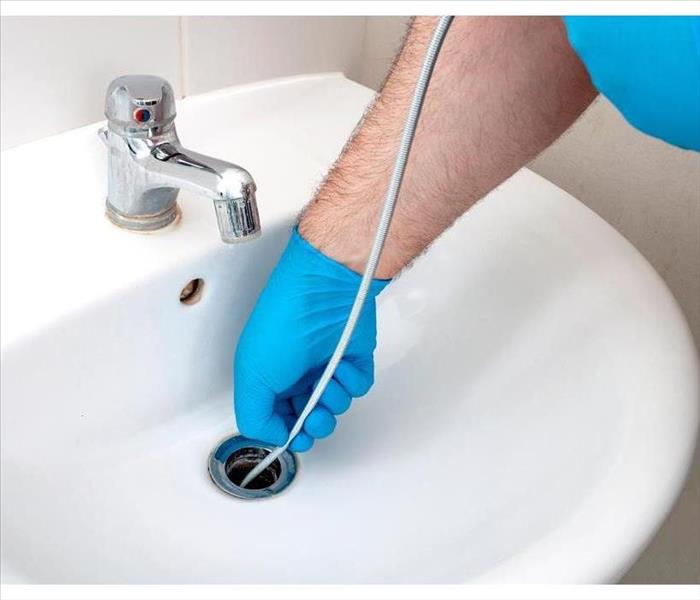 Unclog a pipe with a snake tool.
Unclog a pipe with a snake tool.
It’s hard to imagine anyone not dealing with a clogged drain at some point in his or her life. Whether it’s a kitchen sink, a toilet, a shower, or a drain in the laundry room, you’ve probably fussed with this issue at your Christiana, TN, home. You can always try cleaning the drain or trap, and plungers certainly can work. However, for your toughest jobs, a snake may be the way to go.
What It Does
A snake is a coiled, spiral tool you can use to unclog stopped drains. Normally, it’s about one-quarter of an inch thick and has a handle on the other end. It works differently than a plunger:
- You push the snake farther into the drain to meet the object causing the blockage.
- It breaks up the obstruction.
- It helps you pull out the obstruction.
- A snake is long and usually reaches far into the pipe.
- This device can help with a pipe break or a major clog.
Step One: Push It Into the Drain
Your first task is to take the snake by the handle and push the opposite end into the drain. At the same time, turn the handle. The auger will then start traveling deeper into the clogged drain.
Step Two: Keep Going
Some stopped drains have blockage far into the drain, so it’s important to continue pushing with high pressure and force. This will get your snake farther into the drain. If you continue to crank the handle, it should bend around the trap under the sink. You shouldn’t have much trouble at this point reaching the culprit.
Step Three: Rotate the Tool Until You Know You’ve Freed the Object
It may take some effort, but as you continue turning the snake, you should feel the object being released and moving freely in the pipe. You’ll either break up the object or pull it right out.
A clogged drain can be a pain to repair, but a snake could do the trick. You can also get in touch with a sewage cleanup specialist to give you a hand.
Tips for Preventing Water Damage When You Are Away
3/9/2021 (Permalink)
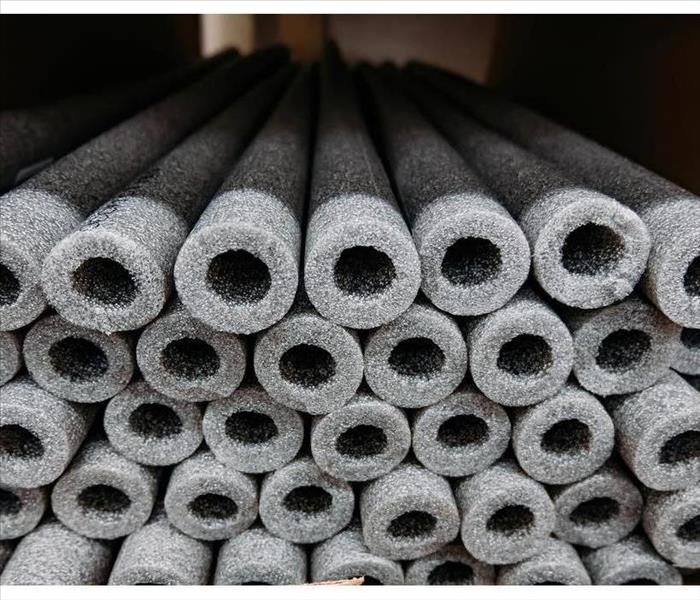 Insulate your pipes to protect them from extreme temperatures.
Insulate your pipes to protect them from extreme temperatures.
Tips for Preventing Water Damage When You Are Away
Taking a trip is a great way to unwind from the stress of everyday life. Coming home to find you need water pipe repair and damage mitigation can negate the relaxation you just enjoyed, though. Preparing your home before your trip is the best way to prevent unpleasant surprises when you return.
Inspection and Maintenance
According to water damage specialists, proper maintenance can help you avoid a flooded home. Before you go on your trip, complete your maintenance checklist:
- Check for cracked and rusted pipes or supply lines
- Inspect roof for damage or weak spots
- Clean gutters and downspouts
- Test your sump pump to ensure it's working properly
Pipe Protection
Water pipe repair becomes necessary when unprotected pipes burst from freezing or other types of damage. If you are traveling away from your home in Walterhill, TN, during the winter, make sure that you have taken the necessary precautions. Insulate your pipes to protect them from extreme temperatures, particularly if they are located in exterior walls. Keep the heater on in your home so that the interior temperature stays warm enough to keep pipes from freezing. Open cabinets under each sink to ensure that warm air can get to the pipes.
Outside Assistance
While you are away, it helps to have someone else who can be your eyes and ears in your absence. Enlist the help of friend or neighbor to keep a watch on your home and look for signs of a broken pipe or other trouble while you are not there. If there is no one available to help, consider turning off your water main before you leave to keep water out of your pipes.
The best time for water pipe repair is before the leak causes damage to your home. If you take the right preventative measures before you leave for your trip, you can relax knowing that your home is safe in your absence.
5 Myths About Polybutylene Plumbing
2/11/2021 (Permalink)
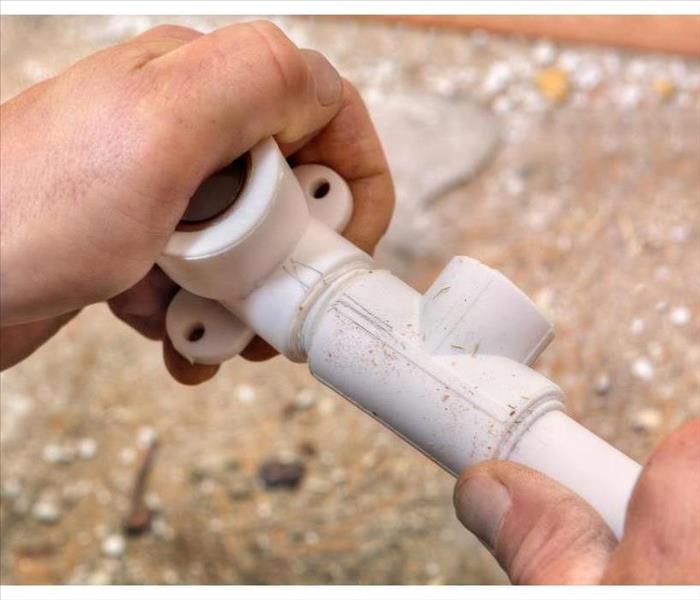 Most polybutylene systems won't fail for years.
Most polybutylene systems won't fail for years.
5 Myths About Polybutylene Plumbing
If you are running your business out of an older building, chances are the plumbing is using some materials of questionable integrity. Here are some myths about one particular material that may convince you it is time for new plumbing.
1. Only Pipes With Plastic Fittings Experience Problems
This is not true. Your system may have metal fittings, but that doesn’t mean it won't fail. This is because systems with metal fittings still contain polybutylene pipes and plastic valves, which can fail. However, systems with plastic fittings have more components that can break and have a greater failure rate. Basically, it is a classic bad versus worse scenario.
2. Replacing Them Is Expensive
Replacing older pipes costs roughly the same as putting in new carpet or redoing the roof. To put this cost into perspective, it is usually cheaper than replacing all of your windows or waterproofing the basement. However, this is contingent on you using a re-piping specialist. While it can be an unexpected cost associated with a business, it can prevent you from needing water restoration professionals.
3. Everything Is Covered Due to the Class-Action Settlement Fund
The class-action settlement was very generous. However, it doesn't cover everything. There are serious limitations on free pipe replacements in Murfreesboro, TN.
4. Problems Occur Due to Poor Installation
While installation problems can occur with polybutylene pipes, this is not the main problem. More common factors include degraded fittings, water quality issues, chlorine levels, and age. One or more of these factors can contribute to a failure over time. In other words, even those that were installed perfectly are still susceptible to failure.
5. These Pipes Have Lasted 10 Years, so They Are Still Good
This is not true. Most polybutylene systems won't fail for years. In fact, it usually takes about 10 years for leaks to develop.
Like many business owners, you probably want to avoid water damage in your building. If this is the case, you should consider these common myths about older pipes and whether you should replace yours.
4 Steps To Fix a Flooded Basement
12/28/2020 (Permalink)
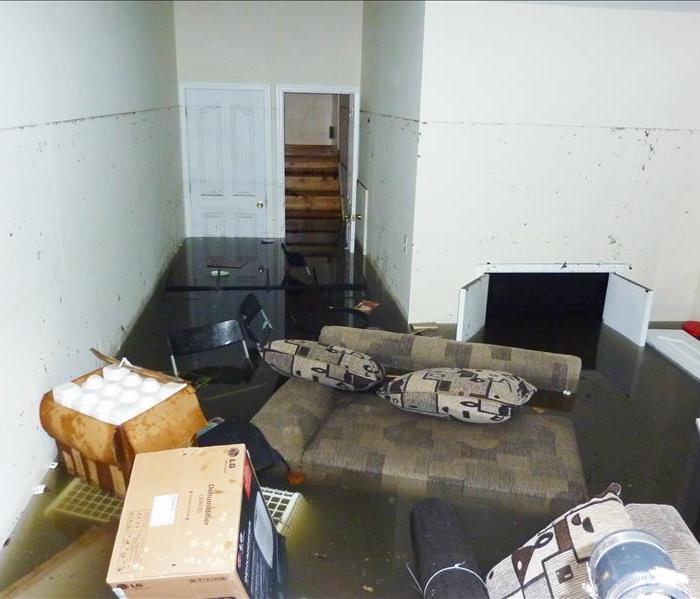 Flooded basement in Murfreesboro, TN.
Flooded basement in Murfreesboro, TN.
4 Steps To Fix a Flooded Basement
If you return to your Murfreesboro, TN, home and find a basement flood, it may feel like it can never be fixed or will be an expensive unexpected cost. If you live in a flood-prone area, having flood insurance coverage helps ease the second concern. When it comes to the fix, along with getting help from a certified water damage and restoration company, there are four steps to take to get your basement back to as it should be.
1. Water Extraction
The sooner you can get the standing water out, the better chances you have of salvaging items and avoiding secondary issues, such as mold. Before grabbing buckets, mops and wet/dry vacuum, ensure it is safe to enter the area. Anytime there is unwanted water, electrical hazards increase.
2. Clear Out Wet Items
When a basement flood happens, there is a good chance there are many objects and belongings that are saturated. After taking videos and pictures of everything as it is for insurance purposes, remove anything that you can and store it in a dry, safe place to dry out. For bigger objects that can’t easily be moved, temporarily cover them to keep them contained.
3. Dry It Out
The key to dealing with any flooded area is getting it dried out. If the basement has windows and the humidity level outside is lower than inside, open them to increase ventilation. Run fans and a humidifier to aid in the drying process until help arrives with industrial tools.
4. Consider Waterproofing Options
As you deal with the mess, it’s the perfect time to consider reinforcing your basement to guard against a repeat situation. The first step is to determine the source. If it wasn’t an unexpected event, such as a pipe burst, there are many sealants and waterproofing methods that can create a barrier from water infiltrating your home.
A basement flood is never anything wants to find themselves facing. By taking quick action and getting the right help, you can get back to “Like it never even happened.”
Can a Toilet Overflow Cause (or Be Caused By) Sewer Damage?
11/24/2020 (Permalink)
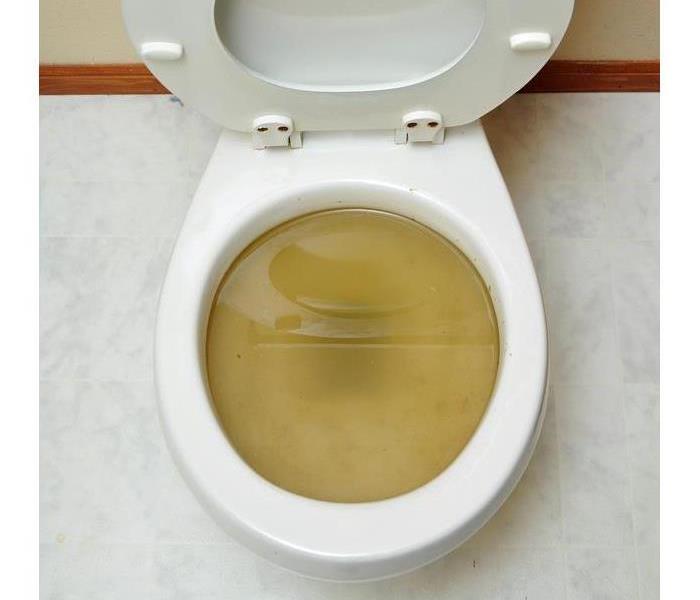 A toilet overflow can be a nasty mess
A toilet overflow can be a nasty mess
Can a Toilet Overflow Cause Sewer Damage?
A toilet overflow can be a nasty mess. Sewage water, also called black water, gets everywhere. Unless the flooded toilet was unused since the last full cleaning, areas where the black water reaches should be considered a biological contamination zone.
Sewer damage or septic problems are a possible cause of toilet flooding. However, in most cases, the issue is with the toilet itself.
The three most common causes of overflow are:
- A blocked drain
- A malfunctioning float
- A blocked vent pipe
What Should You Do First?
If you can access the toilet shutoff valve, turn the water off immediately! Every ounce of water creates a much larger mess.
If there’s no shutoff valve, open the tank lid and carefully lift the float up. Don’t yank it —it could break off, causing a worse disaster. Once the float is high enough, you can prop it up using whatever is handy. However, always use the shutoff valve if one is available.
What Next?
You can now consider what to do with the water in the bowl, but be careful what you stick in the toilet! It can cause sewer damage. If the sewage company finds things you shoved down the toilet, they may conceivably bill you for damages.
If you have a plunger, carefully use that. Follow good practices for use, because if used incorrectly, a plunger is often useless — or it could even make the mess larger.
If a plunger doesn’t work and you know how to use a snake (and have one available), go ahead and carefully try to snake the toilet. A blocked vent pipe can also often be cleared by a snake, so they’re very handy to keep in your toolkit.
If you’ve avoided sewer damage, you can concentrate on cleaning up the black water. Because of the pathogens, this should be left to a certified sewage cleanup company. Professionals have commercial disinfectants that can make quick work of toilet overflow damage.
What To Do Before a Home Adjuster Visits
6/2/2020 (Permalink)
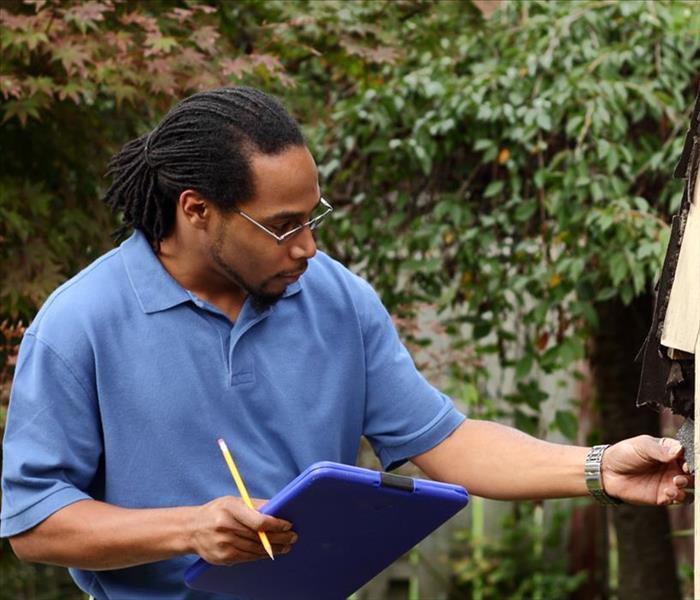 The home adjuster is going to verify that you need aid
The home adjuster is going to verify that you need aid
Consider the Following Three Tips To Help Prepare For The Experience
Water damage is no laughing matter. Whether a broken pipe or overflow, your residence in Murfreesboro, TN, is now greatly impacted, interfering with your everyday life. During this stressful time, chances are you may turn to your insurance agency for financial assistance, filing a claim to alleviate rebuilding and cleaning costs. Part of this process means a home adjuster visit. While this may seem intimidating, don't let it ruffle your feathers. Instead, consider the following three tips to help prepare for the experience.
1. Take Picture or Video
Documentation is extremely important when creating your insurance claim. It's the proof that often validates why you need the money and how it's spent. Go through your old videos and photos. Look for images that clearly illustrate the impacted room and your belongings. This shows the good condition before the incident. Then, snap additional images for comparison. The contrast should indicate the severity of the problem as well as the need to replace or repair. Keep these handy for the visit, in case the adjuster has questions.
2. Survey the Property
The home adjuster is going to walk the premises; however, you should also do this prior to the appointment. With a clipboard in hand, make a note of anything you think is suspect. Write out changes or concerns, and be prepared to share it as you walk through the officially scheduled time. Keep an inventory of items destroyed or affected.
3. Get Estimates
Don't hesitate to provide alternate estimates with the insurance claim. The adjuster determines one projection, but this could be quick and without looking at certain areas such as the roof or electric. Arrange to have a water restoration company come out and offer you quotes, providing their opinion about any further complications. Provide these write-ups and assessments so that these may be considered as well.
The home adjuster is going to verify that you need aid. Be ready with evidence and knowledge to back up your claim.
The Importance of Hiring a Certified Water Damage Expert
5/14/2020 (Permalink)
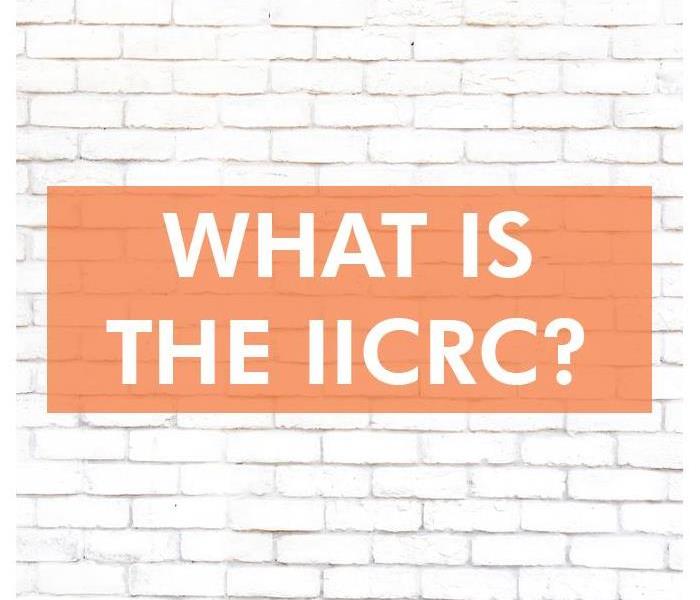 The IICRC is the acronym for the Institute of Inspection, Cleaning and Restoration Certification
The IICRC is the acronym for the Institute of Inspection, Cleaning and Restoration Certification
As a business owner, you have come to expect the unexpected. Sometimes, that can be in the form of a disaster. In Blackman, TN, disasters come in varying degrees and sizes and can involve different elements such as fire, water, and wind. When your disaster involves water clean up, it's important to understand who to go to for help with that cleanup.
Water disasters are a common occurrence. Anything from a toilet overflow to a broken pipe can leave you with a large pool of water in a matter of minutes. What's worse is when you are caught unaware of the situation and it sits for any length of time. In this situation, water clean up becomes a hazard. It's important to utilize a commercial drying specialist certified through the IICRC.
Who is the IICRC?
The IICRC is the acronym for the Institute of Inspection, Cleaning and Restoration Certification. This non-profit organization is the certifying body for the cleaning and restoration industry. The purpose of the IICRC is to ensure best practices during clean up and to develop industry-centric language and terminology for use among its experts.
Why Should I Hire a Certified Water Damage Expert?
The IICRC has experts who have determined the best and safest solution for performing industry-specific tasks, and this includes ensuring the least damage possible occurs to your property and fixtures. These practices prevent errors and speed up the process to you end up paying less. Hiring a commercial drying specialist certified through the IICRC ensures that specialist is proficient in the understanding of commercial structures.
Just like life, disasters will happen. When they involve hazardous or extensive clean up, it is always best to leave the task to certified specialists knowledgeable in industry best practices. A water clean up can be stressful, but knowing it was done right can bring peace of mind.
4 Tips for Avoiding a Flooded Home While You’re on Vacation
2/20/2020 (Permalink)
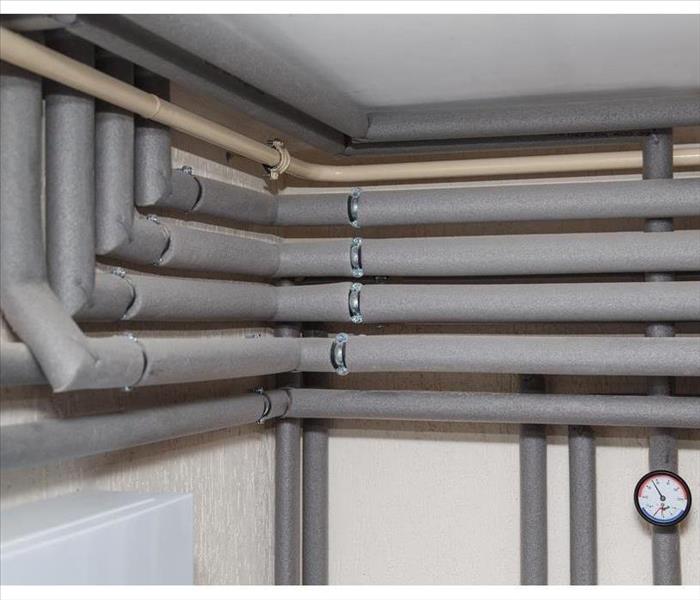 Insulate exposed pipes in your home
Insulate exposed pipes in your home
Consider These 4 Tips To Avoid Disaster When You Are Away From Home
A warm-weather getaway during the winter months can be just what the doctor ordered. As much as you may enjoy hitting the waves on vacation, however, discovering standing water in your home when you return is a different story. Burst pipes, among other factors, can cause flooding during the winter months when water pipe repair and water damage cleanup can be especially costly. So, consider these four tips to avoid a disaster when you’re away from home for days.
1. Clean Gutters
The combination of heavy rain and clogged gutters can cause everything from a roof leak to lawn drainage issues. Either way, the result can be the same — unwanted water inside the house.
2. Insulate Exposed Pipes
Uninsulated, exposed pipes are very vulnerable to extreme winter temperatures. A broken pipe is a real possibility due to water in the pipe freezing and expanding. This could result not only in a flooded home but also a costly water pipe repair bill.
3. Inspect Sump Pump
A sump pump with a pit that’s full of debris pumps inefficiently; sediment can cause clogs in the intake and discharge pipes. Inspect the pit before you leave to make sure it’s free of debris. Also, keep the basement heated so that these and other pipes don’t freeze.
4. Keep the Heat On
Just as you should keep the heat on in the basement, so should you sufficiently heat the upstairs. If extreme winter temperatures are expected during the time that you’re gone, leave kitchen and bathroom sink cabinet doors open to allow warmer air in. Also, put faucets on a slow drip to help avoid the risk of frozen pipes.
If your Smyrna, GA, home sustains water damage due to a burst pipe, hire a plumber for the water pipe repair. In the meantime, you can call on restoration professionals to begin the process of returning your home to its preloss condition.
Protecting Your Home From Winter Storm Damage
11/25/2019 (Permalink)
Winter weather can be unpredictable in Tennessee. Ice and snowstorms, freezing temperatures, and other winter weather can come with little warning. Winter storms can cause all sorts of problems, from power outages to frozen pipes and wind damage.
SERVPRO technicians are ready to help you recover from any winter storm damage to your home, but with some preventative work, you can help protect your home from severe damage.
Prepare Your Home for Winter
Fall is an excellent time to prepare your home for cold weather and winter storms.
Check your ice melt and snow removal equipment
Make sure you have the right ice melt or rock salt on hand to keep walkways and driveways clear of dangerous ice. If you have a snowblower, check to make sure it’s running properly, and you have enough fuel.
Check the heating and air conditioning
Your heating and air conditioning systems last between 10 and 15 years, but with excellent routine maintenance, many units can last more than 20 years! Schedule a routine maintenance inspection each fall to ensure your system is prepared for the cold months ahead. Change your air filters and ensure everything is running well.
Having your HVAC system inspected also ensures your furnace and water heater have enough ventilation to prevent high carbon monoxide levels in your home this winter. People tend to keep their home closed more tightly in winter, increasing the risk of carbon monoxide poisoning.
Inspect the outside of your house
Inspect the siding and wood trim around the outside of your home. Most patios and decks are built with pressure-treated wood, but wood trim around exterior doors and windows is usually just pine wood that can rot quickly if not properly treated.
Also, replace missing or damaged siding and roof flashing that can let water and ice into your home.
Inspect the caulk and paint around all your windows and doors. Look for places where the caulk is cracked, or the paint is chipping. Replace any rotting or broken wood trim and protect it by keeping the trim properly caulked and painted.
Check the drainage around your home. Soil settles over time, creating places for water to pool around your foundation. Fill any low spots with soil and make sure the landscaping slopes away from your house.
Make sure your gutters and downspouts are clean. If your gutters get clogged, it allows water to back up, then overflow and run down the side of your home. Over time this can deteriorate your foundation and even let water get into your basement or crawlspace.
Add downspout extenders to make sure water runs at least 3 to 4 feet away from your home. If the soil near your foundation becomes saturated, then freezes and thaws repeatedly, it can lead to cracks in your foundation and other significant issues.
Turn off all the exterior water faucets and disconnect garden hoses. Drain the water pipes to prevent them from bursting. If you have a sprinkler system, have your sprinkler service drain your system to help avoid freezing and leaks.
Clean your chimney
It’s lovely to curl up by the fire on a cold winter night. Have your fireplace inspected before you start building any fires. Not only can this improve heating efficiency, but it will also prevent any dangerous situations.
Trim dangerous branches
Fall isn’t a great time to prune trees and bushes, but you should cut off any branches that are rubbing against your house. Ice is heavy and known to wreak havoc on power lines and private property. Trim your trees, so you don’t have ice-covered branches threatening your roof, siding, or other parts of your house.
Check your attic
When the temperatures drop, critters look for warm places to hide away. Unfortunately, they can cause a lot of damage to your attic space. Trim your trees away from the house to make it more difficult for critters to access your gable vents. Tack a screen up behind the gable vent to keep out furry and feathered freeloaders. Also, check to make sure there are no holes in your soffit and fascia that will allow birds to get in.
Look for cracks and holes where warm air is escaping from your attic. Even small holes put extra stress on your HVAC system. Fill any gaps with professional-grade caulk to improve energy efficiency and prevent unwanted critters from making themselves at home.
While you are in the attic, make sure there is enough insulation. Properly insulating your attic will help lower energy costs and prevent ice dams from forming and causing water damage. If the insulation looks old, torn, damaged, or wet, then it’s time to replace it.
Prepare the Inside of Your Home
Fall and winter are the most common times of the year for house fires (December and January are the peak months). People are also running furnaces, building fires, and keeping their homes closed tightly, making it easier for carbon monoxide to build up. Test your smoke and carbon monoxide detectors and replace the backup batteries
Make sure your pipes are appropriately insulated to prevent them from freezing and bursting. Insulate the pipes in your basement and crawl space by putting foam sleeves around them. Another way to prevent your pipes from freezing is to keep your interior doors and cabinets open so the heat can flow through your home.
Preventing Water Damage
Water damage from ice dams and frozen pipes is one of the common ways winter storms wreak havoc on your home.
Pipes are more susceptible to freezing when the temperature falls below 20 degrees F. The outdoor pipes that are most susceptible to freezing are outdoor faucets, swimming pool supply lines, and water sprinkler pipes. Indoors, pipes in the basement, crawl spaces and garages are also at risk of freezing.
Open your kitchen and bathroom cabinets to allow warm air to circulate around the pipes. Let water faucets drip if the pipes run through unheated or uninsulated places.
Make sure you know where the main water valve is located. If a pipe does freeze and burst, you will need to be able to turn off the water quickly to prevent further damage.
Ice dams can cause melting snow and ice to back up into your roof and the walls of your home, causing water damage. When warm air escapes from your attic, it causes ice and snow to melt and create icicles or ice dams. If you notice a lot of icicles forming around your home, pay extra attention to the condition of your attic.
Contact SERVPRO
If a winter storm does cause damage to your home, call SERVPRO immediately. Our experts will assess the extent of the damage and create a plan to restore your home fully. Especially when dealing with water damage, it is critical to act quickly to prevent other issues like mold and mildew.
SERVPRO professionals are specialists in water damage restoration and structural drying. Our Disaster Recovery Team can respond quickly with all the right resources to help you recover from all types of winter storms.
How to Prevent Frozen Pipes This Winter
11/19/2019 (Permalink)
Winter storms can bring freezing temperatures, power outages, and other serious issues that can damage your home and property. Frozen water pipes are a common problem during the winter months, especially if the power goes out or a winter storm brings dangerously low temperatures.
If your pipes freeze, the lack of running water is inconvenient at best and can cause extensive water damage! It prevents you from showering, flushing toilets, doing laundry, and other essential tasks.
SERVPRO water damage restoration experts are standing by 24/7 to help you recover from frozen or burst water pipes. Here’s what you need to know about preventing water damage from frozen water pipes.
What Pipes Are Vulnerable to Freezing
Studies show that pipes are most susceptible to freezing when the temperature drops to around 20 degrees F, especially if your pipes are poorly insulated.
The pipes that are most at-risk for freezing are in unheated areas like basements, attics, and garages. Even pipes in your exterior walls and under cabinets can freeze.
In the southeast, we rarely experience bitterly cold temperatures, so most homes have less insulation around the pipes. Fortunately, there are easy, cost-effective ways to keep your pipes safe.
How To Avoid Frozen Pipes
Some of the best ways to keep your pipes from freezing might not help you conserve water or energy. Still, it’s better to have a slightly higher water bill than to deal with significant water damage.
Let your faucets drip
Allow your faucets to drip, especially if the faucet is served by exposed pipes. Running even a trickle of water helps prevent the pipes from freezing.
It’s not necessary to let all the faucets in your house drip. If possible, identify the faucet furthest away from where the water comes into your house. Turning on this faucet keeps the water traveling through most of the pipe system.
Insulate your pipes
Check all around your home to identify all the water pipes that are in unheated areas like attics, crawl spaces, garages, and exterior walls. It might not be possible to access all the pipes, but it is helpful to add insulation wherever you can.
Both hot and cold water pipes should have at least a little insulation. Foam rubber or fiberglass pipe insulation sleeves can cost as little as 50 cents per foot, and it is relatively easy to install. Even a newspaper can provide a little insulation in a pinch.
Insulating the hot water pipes will also help lower your water-heating costs. It helps heat from escaping as the hot water travels through your pipes, and you might even be able to lower the temperature on your water heater.
Adding insulation to the cold water pipes can help prevent the pipes from sweating. When cold pipes run through the warm, humid air, condensation can form on the pipes and can cause puddles on the floor and higher humidity levels. Higher humidity and puddles can cause minor water damage.
Open and close the right doors
Opening the kitchen and bathroom cabinet doors allows warm air to circulate around your pipes. This is especially helpful if your sinks are on an exterior wall.
While you’re opening the cabinet doors, keep the garage door closed. This helps regulate the temperature, especially if you have water pipes running through the garage (don’t forget about pipes that might run behind the drywall).
Set your thermostat
When the weather turns cold, it’s tempting to turn the thermostat down at night to save a little on your heating bill. Keeping your home at the same temperature all the time will help prevent your pipes from freezing.
If you are planning to escape to warmer climates, leave the heat on to protect your home from frozen and burst pipes. Fifty-five degrees F is an ideal temperature when you’re away. It won’t run up your heating bill too much and will prevent your pipes from freezing.
Signs Your Pipes Are Frozen
There are a few signs to look for that will indicate if you have frozen pipes somewhere in your house. If the temperature falls below 32 degrees F, begin to keep an eye on your pipes, especially in southern climates where the pipes tend to be less insulated.
Frost on your pipes: If an exposed pipe freezes, you will probably be able to see frost on the outside of the pipe.
No water: If you turn on the faucet, and no water comes out, or there is less water than usual, your pipes might be frozen. If you turn on your sink and only a trickle of water comes out, the pipe leading to that faucet may be frozen.
Unusual smells: When a pipe or drain is blocked (like when it’s frozen), the only way odors can escape the pipes is back in the direction of your home. So, one sign that your pipes may be frozen is if you notice odd smells coming from your faucets or drains.
What To Do If Your Pipes Freeze
It’s essential to act quickly when your pipes freeze to avoid further damage. It’s critical to thaw the pipe as soon as possible before it bursts and causes water damage.
The first thing to do is to locate the frozen pipe. This can get very complicated because you cannot see most of the pipes in your home. Look for pipes with frost on them. Frozen pipes might also have a slight bulge.
When you find the frozen section, turn on the faucet that the pipe feeds. Turn on the hot and cold handles to help relieve the pressure and give the water a place to go when it begins to thaw.
If the frozen pipe is exposed, you can use a hairdryer, portable space heaters, and hot towels to thaw the pipe.
If the frozen pipe is behind a wall or in an area you cannot easily access, turn up the heat in your home to help thaw the pipes. If you know where in the wall the frozen pipe is running, you can place an infrared lamp or portable space heater close to the wall. This may be enough to thaw the pipes.
Never try to thaw pipes with an open flame or any method that could cause a fire. Contact a licensed plumber if you cannot quickly identify the frozen pipe.
If Your Pipe Bursts
If a pipe bursts, turn off the main water line as quickly as possible. After you turn off the water, contact SERVPRO. Burst pipes can cause extensive water damage. It’s essential to clean and dry everything correctly to prevent mold and mildew from growing and avoid structural problems.
Our technicians are experts at cleaning and drying water damage. We use pumps, vacuums, and other water removal tools to clean all the water. Our experts use specialized equipment to make sure all the water and moisture is removed before we begin the restoration process.
SERVPRO has all the resources to respond to any size winter storm disaster. We are standing by 24/7 to help you restore your home quickly. Contact us today to learn more about our water damage restoration process.
 Our local SERVPRO restoration team is here to help! Whether you live in Murfreesboro, Smyrna, or anywhere in between.
Our local SERVPRO restoration team is here to help! Whether you live in Murfreesboro, Smyrna, or anywhere in between.




 24/7 Emergency Service
24/7 Emergency Service


